SAP vs. Oracle
SAP and Oracle provide some of the most popular ERP software products on the market. The main functions covered by these ERP vendors primarily include financials, sales, supply chain management, and human resources, though they have specialized applications available for specific industries. Find out which SAP or Oracle ERP product suits your business best.
What is SAP ERP?
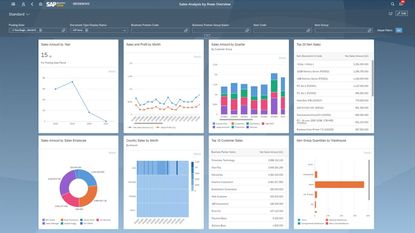
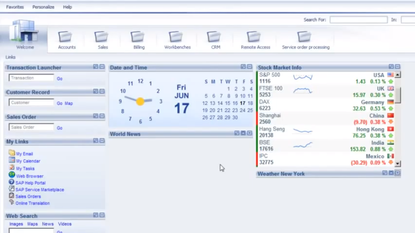
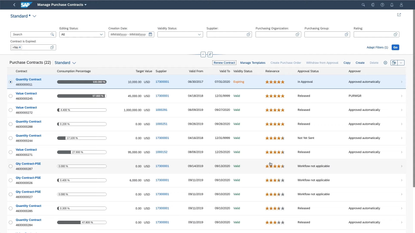
SAP was founded in 1972 by five former IBM engineers. Since then, the company has evolved significantly, launching various versions of its software and expanding into a leading multinational business. Each of SAP’s ERP products is designed with a different audience and goal in mind.
The flagship SAP S/4HANA is perhaps the most well-known, followed by Business One and Business All-in-One. Of the three, S/4HANA makes both the Internet of Things (IoT) and big data accessible with real-time insight into any data. This allows companies to better plan, execute, predict, and simulate at all times.
SAP Business One provides comprehensive business management capabilities for small and medium-sized companies. There was also SAP Business All-in-One, an ERP solution designed for mid-market to enterprise-size businesses that was discontinued by SAP. Both cloud platform systems provide integrated departmental support for finance, sales, supply chain management, production, project management, and production processes.
SAP ERP solutions offer a wide range of functional support for a variety of industry types. These three ERP products are primarily used by manufacturers and distributors, but they are also used in real estate and healthcare. Machine learning and artificial intelligence (AI) functions help customize these solutions to your business needs.
SAP Business One primarily functions as a cloud-based platform. However, these three products are also available with on-premise implementation. Depending on your needs, you can customize a hybrid model between the on-premise and cloud-based products.
What is Oracle?
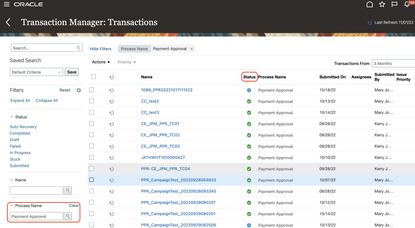
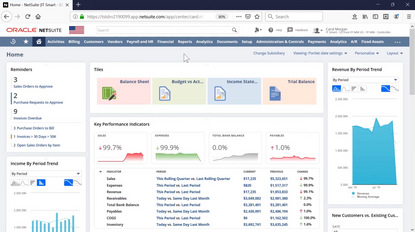
Oracle was founded in 1977 under Software Development Laboratories (SDL). In the 1980s, the company changed its name to Oracle Corporation and expanded its product portfolio, incorporating ERP and CRM software.
Oracle Cloud ERP, formerly Oracle Fusion, is an integrated suite of business modules capable of various ERP functions. This suite allows organizations to manage their financial operations, procurement, inventory, workforce, project delivery, and compliance requirements under one roof.
NetSuite ERP is another product offered through Oracle. It offers strong built-in modules, including ones for inventory control, project management, HR, and more, and can integrate with eCommerce and point-of-sale systems.
These systems can be scaled depending on the applications needed, the number of users requiring access, the number of transactions you process, and more. They are only available as cloud-based solutions.
Pricing Models
Pricing on ERP products depends on various factors, including required functionality, support expectations, implementation and training needs, deployment preference, active promotions, annual revenue, and user count. Consequently, pricing on SAP and Oracle solutions can vary significantly. Also, ERP vendors are software-as-a-service (SaaS) subscriptions, meaning payments are made continually by month or year.
SAP S/4HANA pricing primarily depends on if you’re using the on-premise or cloud option. SAP Business One and Business-All-in-One costs are based on the number of users. Most mid-market to enterprise corporations expect to spend tens of thousands over the first 3 years of use. As an example, the following chart calculates the average spending range over a 3 year SaaS period of total ownership reported by SAP Business One reviewers:
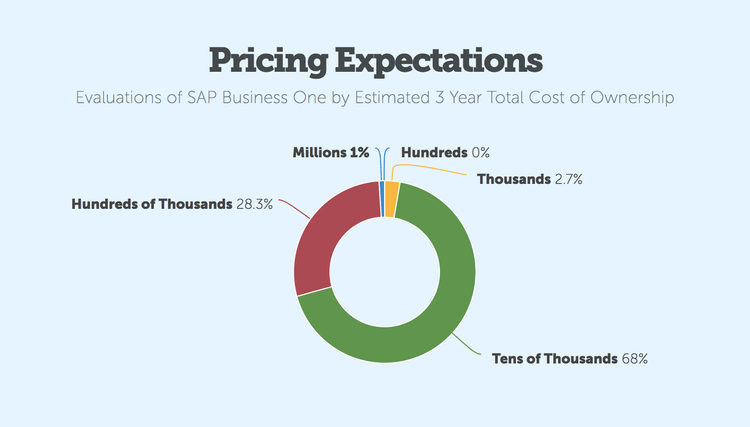
Oracle Cloud ERP has a different pricing structure. The basic platform begins at $175 per user per month, and additional financial controls are available for an additional $80 per user per month. Then, access controls are an added $150 per user per month. NetSuite ERP is available for $99 per user per month.
Organization Size
Both Oracle and SAP offer ERP solutions for businesses ranging from freelancers to global enterprises. Oracle Cloud ERP is mainly intended for mid-market and enterprise corporations, although small businesses can use it. NetSuite is more appropriate for smaller companies.
SAP S/4HANA is intended for enterprises, particularly those with a global presence. Additionally, SAP’s Business One software is popular with mid-market to small businesses, while larger companies prefer the Business All-in-One.
SAP vs Oracle: Which ERP is Best?
SAP and Oracle ERP products both have benefits and drawbacks. Your selection will depend on your business needs, company size, and industry. SAP products tend to be used by enterprise-level manufacturers, while Oracle is better suited to enterprise and midmarket companies in any field. Yet no single platform has a clear advantage over the others without considering your current business processes.
Looking for a new ERP system by SAP or Oracle? Get free help from one of our software advisors.
